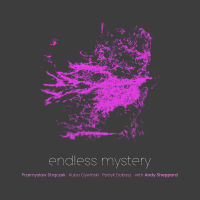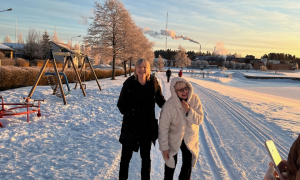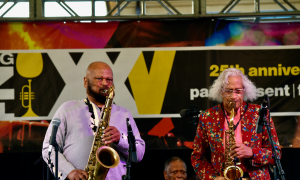Home » Jazz Articles » SoCal Jazz » Jeff Richman: Fresh & Formidable Fusion Pioneer
Jeff Richman: Fresh & Formidable Fusion Pioneer
JR: Exactly. It was such a cool and classy thing to do. We did the tour and I had five solos on the record Can You Feel It? (Atlantic, 1978). I wrote four of the tunes on that record. Yeah, he was such a nice man to handle that the way he did. He gave me the opportunity to grow and be a part of his band. It seems that the least I could do is to name a song as an homage to Ray Barretto.
AAJ: This was just shortly after you graduated from Berklee, yes?
JR: Yes, a little over a year later. I played other gigs as well, but it can be tough going for a while.
AAJ: It's now a thing of legend that so many great guitarists came out of Berklee during the same time period. Was it coincidence that the 1970's spawned Pat Metheny, Stern, Al Di Meola, John Scofield, Chuck Loeb, Bill Frisell, as well as yourself? Not to mention Colaiuta. Was Berklee putting something in the water back then or what?
JR: Also drummer Steve Smith and bassist Neil Stubenhaus. It is pretty amazing when you stop and think about it.
AAJ: Well, what strikes you is that there isn't a 1980's or 1990's or twenty first century version of this.
JR: No, there really isn't. We all started playing when we were about eleven years old. We didn't know each other until college of course, but as it turned out we all wanted the same thing. Berklee was really the only college to go to for guitarists. Funny story from back then involving Chuck Loeb. We ran across each other in a rehearsal hall. I remember that Vinnie was there. Chuck and I just looked at each other and there was just a bad vibe. We just didn't like each other for some reason. I ran into him several times and it was always that same glare. During the last week at Berklee we were both in the hall of the guitar department. He was walking one way and I was walking the other, towards each other, so It was inevitable that we had to speak. He said to me "Do you want to play?" I said, "Okay." The next thing you know we sat down right there and started playing together. It sounded really great. We were laughing and having this really great time together. We became friends at that moment. We were just cracking up because we had the same sense of humor and the same vibe. Then I moved to New York City. So did Chuck. We ended up staying in touch with each other on a regular basis. He would come over to my place in Manhattan. He was living in Brooklyn. We would hang out and play and laugh together just as we had done the last week at Berklee. We even did a few duo gigs together.
AAJ: A nice story with a happy ending. Did you guys ever figure out what the riff was between you in the first place?
JR: You know, it was just some little BS thing that was so trivial I can't even remember now what it was.
AAJ: I know that you and Stern became fast friends. Who else from that noble class of guitarists did you feel good about playing with and/or gained from in any way from technical skills to confidence?
JR: I played a lot with Bill Frisell. We would go over to each other's houses and play standards. I remember that whenever I played with him he truly valued my playing. He listens so well. It's a great credit to him and one of the reasons he has been so successful. He makes me feel so special when I play with him. It's as if he is in love with you and what you are doing at the time. He makes you feel like you are the best guitarist in the world. The problem is that when he leaves, I play and I suck.
AAJ: (laughing hard)
JR: (laughing) But it was Bill that was listening so intently. Nurturing, accepting, and loving. Very special.
AAJ: That's a glowing heartfelt homage that I'm sure Frisell will be touched by. It also reminds me of a similar emotion shared in regard to Frisell by Leni Stern a few years ago. She stated "that playing with Frisell made her feel as if her feet were two feet off the ground."
JR: Oh yes, that's exactly right. Then there's Stern (now referring back to her husband Mike). He would call me to come over and play at his place all the time. He would open up a bottle of wine and we would just play and play and play for hours on end. His place was full of wine bottles. The only drag is that back then he was addicted to drugs.
AAJ: Yeah, Mike and I have talked about that quite a bit. As well as how he and Leni kicked it and got clean together. Very inspiring, but yeah, it must have been difficult to see a friend going through that at the time.
JR: It was. Mike came and stayed at my place for about ten days. He would write people's phone numbers on the wall. When you went over to his place you would see telephone numbers written all over his walls. But anyways here's a funny story that has nothing to do with drugs. I had a yogurt in the refrigerator that was for my breakfast the next morning. There was nothing else in there other than maybe some orange juice or something. He had already been living at my place for a crazy week. It's about midnight and he says to me "Jeff, can I have that yogurt?" I said, "No. It's mine. I'm going to eat it for breakfast." "Please Jeff, can I please have that yogurt?," he replies. Again I said no. Now Mike starts to beg for it. "Oh c'mon old buddy, old friend, you're my best buddy, please let me have the yogurt. How much do you want for that yogurt?" I looked at him angrily and said "Thirty dollars." Keep in mind that thirty dollars is more like fifty or even eighty dollars now.
AAJ: Right yeah, an exorbitant price for a container of yogurt.
JR: Exactly. But he says "really? Oh thank you so much. You're such a good friend, you're my buddy, man." Then he wrote me out a check for thirty dollars. He grabbed the yogurt and ate it so gingerly, he was so happy, and was spilling it on his shirt. It was so hilarious. The next day was like Ground Hog Day. I bought another yogurt for the next morning and he left me a check for thirty dollars.
AAJ: (laughing, laughing, and laughing) That's absolutely hysterical, Jeff. I would think it funny for anyone, but especially if you know Mike. After Berklee you conquered New York City...
JR: (much laughter)
AAJ: (the laughter continues) It was off to Los Angeles in 1979. What led to that decision? A specific gig or just idea that there would be more overall opportunities there?
JR: Ah, well, that leads to a good story, if you have time to hear it.
AAJ: Absolutely. Time is of no concern when we are having fun.
JR: Well, I was in New York bopping around. Struggling more than conquering to be honest. My favorite musician at the time was George Duke. He had put out the record The Aura Will Prevail (MPS, 1975) that had fusion, a Brazilian song, he sang, he soloed, some of it was Zappaesque. Everything was on that album, it was just beautiful. I knew John Scofield. This was before he was well known. He was another struggling cat trying to get somewhere. Sco had just been playing with a Billy Cobham and Duke led band. I saw in Downbeat that Duke was looking for a guitarist. So I called Sco and he gave me Duke's phone number. I called and was surprised to start with that he answered the phone. No going through someone else or voicemail etc. I, of course, told him why I was calling and how I got his number. Duke told me that he had a guitarist but that he wasn't sure if the guy was in or out. So he wondered if I could come in and audition on Monday. Mind you this is Friday and I am in New York. The Monday audition was in Los Angeles. I said sure thing, I will get a ticket and fly out over the weekend and be there to audition on Monday. Now he says, "wait a minute you're in New York City? You're calling from New York? Why would you want to do that? I told him how much I loved his music and how much I would love to play with him and that it was no problem, I can be there. He was surprised, but said okay. So I flew out and got a room at some cruddy little hotel on Sunset Blvd. On Monday I go to the audition. He was a great auditoner, by the way. He would play something and then ask me to play it. He would play something else and again ask me to play it. We went through about fifteen short vignettes like this and we were done. He says "okay I'll call you tomorrow." I went back to my room and waited. He indeed did call the next day and said "well, I liked the way you played. But the other guitarist is in the band. However I appreciate that you came all the way out from New York to audition for me. I know that Flora Purim is looking for a guitarist. Billy Cobham is looking for a guitarist and so is Tony Williams. He said that he would call all three of them and recommend me. Later that afternoon the manager for Flora Purim called asking me to audition. They picked me up and took me to the studio. Who is there? Jimmy Haslip. That was the first time I ever met him. He had auditioned the day before, along with drummer Ricky Lawson. So I got the gig and that's the story of coming to Los Angeles.
AAJ: That's a great story. Thanks for sharing it. Interestingly, in a conversation about Yellowjackets Haslip told me about that day before audition, as it was the first time he met Lawson. So it's a small world and all that. What about Cobham or Williams, did either of them call you?
JR: I never heard from Williams. Cobham called and wanted me to audition. I told him I couldn't do it because I got the gig with Flora. He got a little pissed off with me.
AAJ: I can understand that to a degree. But being booked on another tour or other gigs is commonplace. I'm sure he was just frustrated with his situation, not actually pissed at you. At any rate, that was the beginning of a long and successful career based in Los Angeles. Back to the future, the album title XYX, does that stand for something or some sort of significance?
JR: Actually it doesn't. When you finish recording you have to put down a name. It could be anything.
AAJ: Yeah even if it is just a temporary placeholder.
JR: Yeah, so I just put down XYZ. Turns out that Jimmy liked that title, so we stuck with it.
AAJ: Before we wrap up I'd like to revisit your new record for a moment. You don't get to your eighteenth studio record unless there was/is a lot of substance in its many predecessors. You are one of a select few guitarists that have enriched the fusion genre since its 1970's roots and now, well over forty years later, continues to shine a bright and creative light with XYZ. Thanks for taking the time and talking with me today, Jeff.
JR: My pleasure, Jim. I'll tell you one last thing that just happened a couple of days ago. You know the way we all get scam calls. I got a call the other day from a number I didn't recognize so I just let it go. It was from area code 310, which is L.A. For some reason I got to thinking about it and decided to call the number back, which I never do. So the guy answers and says "Hi Jeff." So naturally I asked who I was talking to. The response is "It's Lee Ritenour."
AAJ: Oh my gosh.
JR: That was exactly my response. Turns out he had butt dialed me, So we ended up having a conversation for a little bit. Lee is a very sweet, very nice man. I have known him for many years now. We aren't close friends, but I have known him since the beginning of his career. I told him about XYZ and he told me that he would check it out. Later I received a text from Lee telling me that he thought it was the best album I've ever done. He complimented me and the work in many ways. It was a really nice thing to have happened
AAJ: I would say so. That's cool to have something random like that happen. And for it to be so positive! You know I started to wrap up but your Ritenour story spurs another question. Ritenour is of course correct on how great your new record is. However, it was preceded by seventeen others, many of which are remarkable. It has to be difficult to choose, but if you were selecting three or five of your records for one to check out which ones would they be?
JR: Oh man, that's hard. The last one I did, Sizzle (Nefer, 2017) for sure.
AAJ: For sure, for sure.
JR: And the one before that, Hotwire (Nefer, 2015). Also Aqua (Nefer, 2011). Then before that I had a brilliant producer named Philip Giffin, who taught me a lot. He produced several projects that came out really great. In fact he produced my first twelve records, including Fingerpaints (MGI, 1989) On that I do duets with many great guitarists, such as Stern, Wayne Johnson, Scott Henderson, Mike Miller, among others. Then there's The Way In (MGI, 1990) ,which has Al Di Meola and Steve Lukather on it. That's kind of a magical album. That's probably, well actually there is one more I should mention. That one is called Sand Dance (Alchemy Records, 1998). Giffin is a great friend who has influenced me immensely in my career.
AAJ: That's very cool. I need to pull out Sand Dance. I haven't listened to that in some time. It's going to sound really fresh... and there's that word again. With XYX you once again raise the bar. This is top shelf fusion. It's an accomplishment in itself that your fan base has come to have those expectations. That's something to be proud of. Do your tunes generally come out the way you expect or are there surprises along the way?
JR: On most records there is a tune that you just know is going to be the one. That it is going to be such a great song once we record it. Then we record it and it's kind of lackluster. It's not what I thought it was going to be. A little bit of a disappointment. On the other hand, there are songs that you really didn't know what to expect and they turn out magical.
AAJ Interesting that sometimes no matter what you have, or think you have, you don't really know until it's finished. The proof is in the pudding.
JR: That's really the way it is much of the time. All you can do is pack all your bags. Make sure nothing is loose. But you still have to expect the unexpected or be open to the unexpected.
AAJ: I would think that the musicians involved could be a factor as well. Such as let's say the drummer that adds a little something. Or not even adding, but just in the way he/she approaches the material.
JR: Absolutely. That's absolutely true. There's many factors at play. But the unknown and the experimentation is all part of the magic, the fun of making music.
AAJ: Ah. the magic and fun of making music. That sounds like a pleasant note to close on. For real this time (laughing).
JR: I have enjoyed our conversation very much. Happy to talk with you any time, Jim. Thanks again for the review of my new record and all your help.
AAJ: Thanks for opening up regarding Parkinson's. My thoughts and prayers will continue to be there for you, Jeff. You know how much you have enjoyed a conversation when two hours go by in the blink of an eye.
Tags
SoCal Jazz
Jeff Richman
Jim Worsley
United States
California
Los Angeles
Ronnie Laws
Doc Severinsen
Lee Ritenour
Oz Noy
Jimmy Haslip
Dave Weckl
Dennis Chambers
Keith Carlock
The Turtles
The Beatles
The Ventures
Buddy Rich
Doris Day
Dean Martin
Jimi Hendrix
jeff beck
Led Zeppelin
Jethro Tull
Spirit
Steppenwolf
Steve Miller Band
Santana
The Chambers Brothers
Yardbirds
Rod Stewart
Ron Wood
Eric Clapton
Blind Faith
John Coltrane
Miles Davis
Carlos Santana
steely dan
Mike Varney
Mike Stern
Pat Martino
Steve Lukather
John Scofield
Mahavishnu Orchestra
Jerry Goodman
Joel Taylor
Vinnie Colaiuta
Danny Gottlieb
Scott Henderson
Ray Barretto
pat metheny
Al Di Meola
Chuck Loeb
Bill Frissel
Steve Smith
Neil Stubenhaus
Leni Stern
George Duke
Billy Cobham
Flora Purim
Tony Williams
Ricky Lawson
The Yellowjackets
Philip Giffin
Wayne Johnson
Mike Miller
PREVIOUS / NEXT
Support All About Jazz
 All About Jazz has been a pillar of jazz since 1995, championing it as an art form and, more importantly, supporting the musicians who make it. Our enduring commitment has made "AAJ" one of the most culturally important websites of its kind, read by hundreds of thousands of fans, musicians and industry figures every month.
All About Jazz has been a pillar of jazz since 1995, championing it as an art form and, more importantly, supporting the musicians who make it. Our enduring commitment has made "AAJ" one of the most culturally important websites of its kind, read by hundreds of thousands of fans, musicians and industry figures every month.























